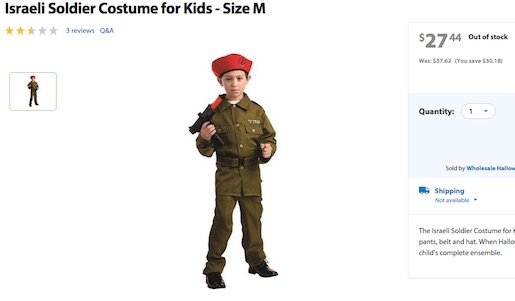Amid outrage, Walmart withdraws Israeli soldier costume

DEARBORN, United States - Offensive costumes have been sparking online outrage since the dawn of the Internet. Two years ago, a woman was condemned for wearing an outfit depicting a victim of the Boston Marathon bombing. Last year, angry Internet users slammed men in Islamic State (IS) costumes.
This year, a giant retailer was at the receiving end of the outrage for what activists say are bigoted costumes. Walmart stopped selling an Israeli soldier costume for children and a big plastic nose dubbed "Sheik Fagin nose" on Tuesday after enraged customers condemned the products.
The Israeli soldier costume consists of military fatigues, a jacket with the Hebrew abbreviation for "Israel Defense Forces" and a toy gun that resembles an Israeli-made Uzi.
The Michigan regional office of the American-Arab Anti-Discrimination Committee (ADC) sent a national call to action with a letter on Tuesday morning, asking supporters to contact Walmart to stop selling the costumes.
The civil rights group denounced Walmart for the Halloween outfit, saying that the retailer offended its biggest customer base in Dearborn, Michigan, home to one of the largest Arab communities in the US.
"A children’s costume depicting a symbol of fear, violence and a long history of dispossession is no laughing matter," the letter reads.
It also denounced selling costumes that depict Arab sheikhs, adding that perpetuating stereotypes leads to hate crimes.
"The glorification of Israeli soldiers juxtaposed with the mockery of Arab people promotes an anti-Arab racism that is all too common in America," the letter adds.
The Washington-based Arab American Institute (AAI) described the Israeli soldier costume as "appalling".
"New height of American ignorance on #Palestine," the institute tweeted.
Outrage
Online anger flared after the link featuring the Israeli soldier costume started making rounds on social media platforms.
Palestinian-American comedian Amer Zahr tweeted: "So little kids will be knocking on my door next Saturday saying, 'Trick or ... wow, your house is nice. Get out.'"
The costume is still available on Amazon.com.
"If my child wears this can he then murder Palestinian children with impunity?" an Amazon customer asked in the review section for the product.
Mirna Haidar, an Arab-American activist based in New York, said the costume highlights the strong ties between Israel and American corporations.
"This costume is not just a mask that American politicians and corporations can just take off," she told Middle East Eye.
"It is the reality. It is the face of the relationship between Americans and mass killers - the IDF (Israeli army). Men who actually wear these uniforms killed 551 children in the 2014 alone."
'Romantacising violence'
Hatem Abudayyeh, the co-founder of the US Palestinian Community Network (USPCN), said the costume is a symbol of apartheid that glorifies war and oppression.
The USPCN used the hashtag #StopSellingIsraeliApartheid to urge its followers on social media to contact Walmart and demand that the store stop selling the costume.
"I am not shocked because this is Walmart after all," Abudayyeh told MEE. "It took thousands and thousands of people calling and emailing for them to take the Confederate flag out of their stores. It's not surprising, but it's disturbing for sure."
The retail giant stopped selling the Confederate flag, which is seen as a symbol of racism, after a white supremacist killed nine African Americans at a church in Charleston, North Carolina.
Walmart is also criticised by labour movements that accuse it of underpaying workers.
Abudayyeh said the costume plays into US foreign policy "propaganda" that portrays Israel as the only democracy in the midst of the reactionary Arab world.
"Halloween costumes are meant to be either scary, funny or sexy," he told MEE. "If you're dressing up as another culture, ethnicity or religion to be scary, funny or sexy, that's the first indication you probably shouldn't do that."
New MEE newsletter: Jerusalem Dispatch
Sign up to get the latest insights and analysis on Israel-Palestine, alongside Turkey Unpacked and other MEE newsletters
Middle East Eye delivers independent and unrivalled coverage and analysis of the Middle East, North Africa and beyond. To learn more about republishing this content and the associated fees, please fill out this form. More about MEE can be found here.




